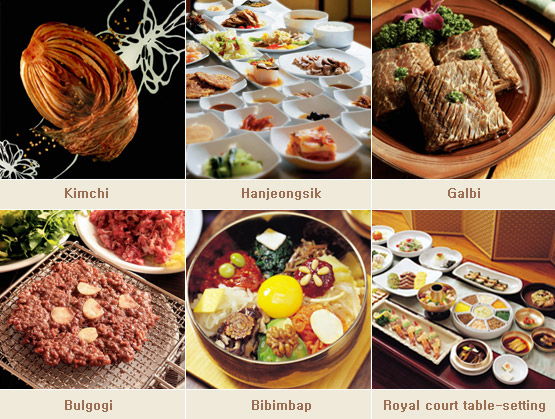- Food
- Korean cuisine is largely based upon rice, vegetables, and meats. Traditional Korean meals are noted for the number of side dishes(banchan) that accompany steam-cooked short-grain rice. Kimchi is served often, sometimes at every meal. Commonly used ingredients include sesame oil, doenjang (fermented bean paste), soy sauce, salt, garlic, ginger, pepper flakes and gochujang (fermented red chili paste)

- In South Korea, inexpensive food may be purchased from Pojangmacha, street carts during the day, where customers may eat standing beside the cart or have their food wrapped up to take home. At night, they become small tents that sell foods, drinks, and alcoholic beverages. Seasonal foods include hotteok, and bungeoppang, which are enjoyed inautumn and winter. Gimbap and tteokbokki are also very popular street food.
Dining traditions and utensils vary from country to country, as do notions of etiquette. Here are some examples of Korean Table Etiquette.
- a. When in the company of elders, take your seat according to social ranking with the youngest or lowest ranked person closest
to the door. After the elders pick up their spoons, others can begin to eat. Try to keep pace with elders while eating. It could
be considered rude to show that you have finished your meal before elder people have. If at all possible, keep eating a bit until
the elders have finished their meal.
- b. The spoon and chopsticks should not be held together in one hand. Use the spoon only for rice and soup.
- c. For the sake of cleanliness, do not use a used spoon for side dishes.
- d. Use an individual plate for your own food when platters arrive for the entire table. Be careful not to make noises when eating
and drinking. Avoid knocking your spoon, chopsticks or plates around.
- e. Take food within reach and do not stretch your arms out too far
- f. After a meal, return your spoon and chopsticks to the spot where they were placed. Fold the used napkin and put it back on the
table.
- g. When coughing or sneezing during a meal, turn your head to one side and cover your mouth with a handkerchief as to not
bother your neighbors. Nose blowing should be saved for the restroom.
* Source: The beauty of Korean Food: With 100 Best-loved recipes by Institute of Traditional Korean Food

